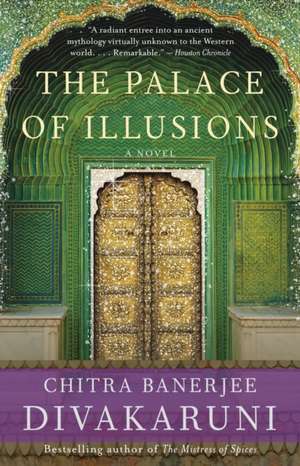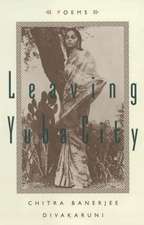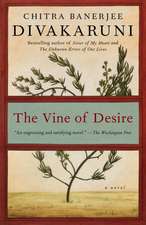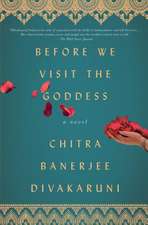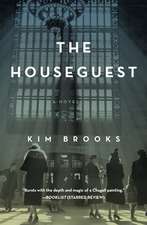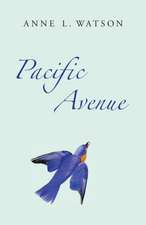The Palace of Illusions
Autor Chitra Banerjee Divakarunien Limba Engleză Paperback – 31 ian 2009
Vezi toate premiile Carte premiată
Audies (2009)
Preț: 102.90 lei
Nou
Puncte Express: 154
Preț estimativ în valută:
19.69€ • 20.56$ • 16.26£
19.69€ • 20.56$ • 16.26£
Carte disponibilă
Livrare economică 25 martie-08 aprilie
Preluare comenzi: 021 569.72.76
Specificații
ISBN-13: 9781400096206
ISBN-10: 1400096200
Pagini: 360
Dimensiuni: 133 x 203 x 20 mm
Greutate: 0.28 kg
Editura: Anchor Books
ISBN-10: 1400096200
Pagini: 360
Dimensiuni: 133 x 203 x 20 mm
Greutate: 0.28 kg
Editura: Anchor Books
Notă biografică
Chitra Banerjee Divakaruni is the author of the bestselling novels Queen of Dreams, Mistress of Spices, Sister of My Heart, and The Vine of Desire, and of the prizewinning story collections Arranged Marriage and The Unknown Errors of Our Lives. She lives in Houston, Texas, and teaches creative writing at the University of Houston.
Extras
1
fire
Through the long, lonely years of my childhood, when my father’s palace seemed to tighten its grip around me until I couldn’t breathe, I would go to my nurse and ask for a story. And though she knew many wondrous and edifying tales, the one I made her tell me over and over was the story of my birth. I think I liked it so much because it made me feel special, and in those days there was little else in my life that did. Perhaps Dhai Ma realized this. Perhaps that was why she agreed to my demands even though we both knew I should be using my time more gainfully, in ways more befitting the daughter of King Drupad, ruler of Panchaal, one of the richest kingdoms in the continent of Bharat.
The story inspired me to make up fancy names for myself: Offspring of Vengeance, or the Unexpected One. But Dhai Ma puffed out her cheeks at my tendency to drama, calling me the Girl Who Wasn’t Invited. Who knows, perhaps she was more accurate than I.
This winter afternoon, sitting cross–legged in the meager sunlight that managed to find its way through my slit of a window, she said, “When your brother stepped out of the sacrificial fire onto the cold stone slabs of the palace hall, all the assembly cried out in amazement.”
She was shelling peas. I watched her flashing fingers with envy, wishing she would let me help. But Dhai Ma had very specific ideas about activities that were appropriate for princesses.
“An eyeblink later,” she continued, “when you emerged from the fire, our jaws dropped. It was so quiet, you could have heard a housefly fart.”
I reminded her that flies do not perform that particular bodily function.
She smiled her squint-eyed, cunning smile. “Child, the things you don’t know would fill the milky ocean where Lord Vishnu sleeps—and spill over its edges.”
I considered being offended, but I wanted to hear the story. So I held my tongue, and after a moment she picked up the tale again.
“We’d been praying for thirty days, from sun-up to sundown. All of us: your father, the hundred priests he’d invited to Kampilya to perform the fire ceremony, headed by that shifty-eyed pair, Yaja and Upayaja, the queens, the ministers, and of course the servants. We’d been fasting, too—not that we were given a choice—just one meal, each evening, of flattened rice soaked in milk. King Drupad wouldn’t eat even that. He only drank water carried up from the holy Ganga, so that the gods would feel obligated to answer his prayers.”
“What did he look like?”
“He was thin as the point of a sword, and hard like it, too. You could count every bone on him. His eyes, sunk deep into their sockets, glittered like black pearls. He could barely hold up his head, but of course he wouldn’t remove that monstrosity of a crown that no one has ever seen him without—not even his wives, I’ve heard, not even in bed.”
Dhai Ma had a good eye for detail. Father was, even now, much the same, though age—and the belief that he was finally close to getting what he’d wanted for so long—had softened his impatience.
“Some people,” she continued, “thought he was going to die, but I had no such fears. Anyone who wanted revenge as badly as your royal father did wouldn’t let go of body and breath so easily.” She chewed ruminatively on a handful of peas.
“Finally,” I prompted her, “it was the thirtieth day.”
“And I for one was heartily thankful. Milk and rice husk is all very well for priests and widows, but give me fish curry with green chilies and tamarind pickle any day! Besides, my throat was scraped raw from gabbling all those unpronounceable Sanskrit words. And my buttocks, I swear, they were flat as chapatis from sitting on that freezing stone floor.
“But I was scared, too, and stealing a glance here and there, I saw I wasn’t the only one. What if the fire ceremony didn’t work the way the scriptures had claimed it would? Would King Drupad put us all to death, claiming we hadn’t prayed hard enough? Once I’d have laughed if someone had suggested our king might do that. But things had changed since the day when Drona appeared at court.”
I wanted to ask about Drona, but I knew what she’d say.
Impatient as mustard seeds sputtering in oil, that’s what you are, even though you’re old enough to be married off any day now! Each story will come in its time.
“So when your royal father stood up and poured that last pot of ghee into the flames, we all held our breath. I prayed harder than I’d ever done in my life—though it wasn’t for your brother I was praying, not exactly. Kallu, who was cook’s apprentice then, had been courting me, and I didn’t want to die before I’d experienced the joys of having a man in my bed. But now that we’ve been married for seven years—” Here Dhai Ma paused to snort at the folly of her younger self.
If she got onto the subject of Kallu, I wouldn’t hear the rest of the story today.
“Then the smoke rose,” I interjected, with experienced dexterity.
She allowed herself to be pulled back into the tale. “Yes, and a spiraling, nasty-smelling black smoke it was, with voices in it. The voices said, Here is the son you asked for. He’ll bring you the vengeance you desire, but it’ll break your life in two.
“I don’t care about that, your father said. Give him to me.
“And then your brother stepped from the fire.”
I sat up straight to listen better. I loved this part of the story. “What did he look like?”
“He was a true prince, that one! His brow was noble. His face shone like gold. Even his clothes were golden. He stood tall and unafraid, though he couldn’t have been more than five years old. But his eyes troubled me. They were too soft. I said to myself, How can this boy avenge King Drupad? How can he kill a fearsome warrior like Drona?”
I worried about my brother, too, though in a different way. He would succeed in completing the task he was born for, I had no doubt of that. He did everything with such meticulous care. But what would it do to him?
I didn’t want to think of it. I said, “And then?”
Dhai Ma made a face. “Can’t wait till you appear, eh, Madam Full of Yourself?” Then she relented.
“Even before we’d finished cheering and clapping, even before your father had a chance to greet your brother, you appeared. You were as dark as he was fair, as hasty as he was calm. Coughing from the smoke, tripping over the hem of your sari, grabbing for his hand and almost sending him tumbling, too—”
“But we didn’t fall!”
“No. Somehow you managed to hold each other up. And then the voices came again. They said, Behold, we give you this girl, a gift beyond what you asked for. Take good care of her, for she will change the course of history.”
“ ‘Change the course of history’! Did they really say that?”
Dhai Ma shrugged. “That’s what the priests claimed. Who can tell for sure? You know how sounds boom and echo in that hall. The king looked startled, but then he picked the two of you up, holding you close to his chest. For the first time in years, I saw him smile. He said to your brother, I name you Dhristadyumna. He said to you, I name you Draupadi. And then we had the best feast this kingdom has ever seen.”
As Dhai Ma counted out the feast foods on her fingers, smacking her lips in happy remembrance, my attention veered to the meaning of the names our father chose. Dhristadyumna, Destroyer of Enemies. Draupadi, Daughter of Drupad.
Dhri’s name fell within the bounds of acceptability—though if I were his parent I might have picked a more cheerful appellation, like Celestial Victor, or Light of the Universe. But Daughter of Drupad? Granted, he hadn’t been expecting me, but couldn’t my father have come up with something a little less egoistic? Something more suited to a girl who was supposed to change history?
I answered to Draupadi for the moment because I had no choice. But in the long run, it would not do. I needed a more heroic name.
Nights, after Dhai Ma had retired to her quarters, I lay on my high, hard bed with its massive posts and watched the oil lamp fling flickery shadows against the pocked stone of the walls. I thought of the prophecy then, with yearning and fear. I wanted it to be true. But did I have the makings of a heroine—courage, perseverance, an unbending will? And shut up as I was inside this mausoleum of a palace, how would history even find me?
But most of all I thought of something that Dhai Ma didn’t know, something that ate at me like the rust corroding the bars on my window: what really happened when I stepped from the fire.
If there were voices, as Dhai Ma claimed, prophesying my life in a garbled roar, they hadn’t come yet. The orange lick of flames fell away; the air was suddenly cold. The ancient hall smelled of incense, and under it, an older smell: war-sweat and hatred. A gaunt, glittering man walked toward my brother and me as we stood hand in hand. He held out his arms—but for my brother alone. It was only my brother he meant to raise up to show to his people. Only my brother that he wanted. Dhri wouldn’t let go of me, however, nor I of him. We clung together so stubbornly that my father was forced to pick us both up together.
I didn’t forget that hesitation, even though in the years that followed King Drupad was careful to fulfill his fatherly duty and provide me with everything he believed a princess should have. Sometimes, when I pressed him, he even allowed me privileges he kept from his other daughters. In his own harsh and obsessive way, he was generous, maybe even indulgent. But I couldn’t forgive him that initial rejection. Perhaps that was why, as I grew from a girl into a young woman, I didn’t trust him completely.
I turned the resentment I couldn’t express toward my father onto his palace. I hated the thick gray slabs of the walls—more suited to a fortress than a king’s residence—that surrounded our quarters, their tops bristling with sentries. I hated the narrow windows, the mean, dimly lit corridors, the uneven floors that were always damp, the massive, severe furniture from generations ago that was sized more for giants than men. I hated most of all that the grounds had neither trees nor flowers. King Drupad believed the former to be a hazard to security, obscuring the vision of the sentries. The latter he saw no use for—and what my father did not find useful, he removed from his life.
Staring down from my rooms at the bare compound stretching below, I’d feel dejection settle on my shoulders like a shawl of iron. When I had my own palace, I promised myself, it would be totally different. I closed my eyes and imagined a riot of color and sound, birds singing in mango and custard apple orchards, butterflies flitting among jasmines, and in the midst of it—but I could not imagine yet the shape that my future home would take. Would it be elegant as crystal? Solidly precious, like a jewel–studded goblet? Delicate and intricate, like gold filigree? I only knew that it would mirror my deepest being. There I would finally be at home.
My years in my father’s house would have been unbearable had I not had my brother. I never forgot the feel of his hand clutching mine, his refusal to abandon me. Perhaps he and I would have been close even otherwise, segregated as we were in the palace wing our father had set aside for us—whether from caring or fear I was never sure. But that first loyalty made us inseparable. We shared our fears of the future with each other, shielded each other with fierce protectiveness from a world that regarded us as not quite normal, and comforted each other in our loneliness. We never spoke of what each one meant to the other—Dhri was uncomfortable with effusiveness. But sometimes I wrote him letters in my head, looping the words into extravagant metaphors. I’ll love you, Dhri, until the great Brahman draws the universe back into Himself as a spider does its web.
I didn’t know then how sorely that love would be tested, or how much it would cost both of us.
2
blue
Perhaps the reason Krishna and I got along so well was that we were both severely dark–skinned. In a society that looked down its patrician nose on anything except milk–and–almond hues, this was considered most unfortunate, especially for a girl. I paid for it by spending hour upon excruciating hour being slathered in skin–whitening unguents and scrubbed with numerous exfoliants by my industrious nurse. But finally she’d given up in despair. I, too, might have despaired if it hadn’t been for Krishna.
It was clear that Krishna, whose complexion was even darker than mine, didn’t consider his color a drawback. I’d heard the stories about how he’d charmed his way into the hearts of the women of his hometown of Vrindavan—all 16,000 of them! And then there was the affair of Princess Rukmini, one of the great beauties of our time. She’d sent him a most indecorous love letter asking him to marry her (to which he’d promptly and chivalrously responded by carrying her off in his chariot). He had other wives, too—over a hundred, at last count. Could the nobility of Kampilya be wrong? Could darkness have its own magnetism?
When I was fourteen, I gathered up enough courage to ask Krishna if he thought that a princess afflicted with a skin so dark that people termed it blue was capable of changing history. He smiled. That was how he often answered my questions, with an enigmatic smile that forced me to do my own thinking. But this time he must have sensed my confused distress, for he added a few words.
“A problem becomes a problem only if you believe it to be so. And often others see you as you see yourself.”
I regarded this oblique advice with some suspicion. It sounded too easy to be true. But when the festival of Lord Shiva approached, I decided to give it a try.
From the Hardcover edition.
fire
Through the long, lonely years of my childhood, when my father’s palace seemed to tighten its grip around me until I couldn’t breathe, I would go to my nurse and ask for a story. And though she knew many wondrous and edifying tales, the one I made her tell me over and over was the story of my birth. I think I liked it so much because it made me feel special, and in those days there was little else in my life that did. Perhaps Dhai Ma realized this. Perhaps that was why she agreed to my demands even though we both knew I should be using my time more gainfully, in ways more befitting the daughter of King Drupad, ruler of Panchaal, one of the richest kingdoms in the continent of Bharat.
The story inspired me to make up fancy names for myself: Offspring of Vengeance, or the Unexpected One. But Dhai Ma puffed out her cheeks at my tendency to drama, calling me the Girl Who Wasn’t Invited. Who knows, perhaps she was more accurate than I.
This winter afternoon, sitting cross–legged in the meager sunlight that managed to find its way through my slit of a window, she said, “When your brother stepped out of the sacrificial fire onto the cold stone slabs of the palace hall, all the assembly cried out in amazement.”
She was shelling peas. I watched her flashing fingers with envy, wishing she would let me help. But Dhai Ma had very specific ideas about activities that were appropriate for princesses.
“An eyeblink later,” she continued, “when you emerged from the fire, our jaws dropped. It was so quiet, you could have heard a housefly fart.”
I reminded her that flies do not perform that particular bodily function.
She smiled her squint-eyed, cunning smile. “Child, the things you don’t know would fill the milky ocean where Lord Vishnu sleeps—and spill over its edges.”
I considered being offended, but I wanted to hear the story. So I held my tongue, and after a moment she picked up the tale again.
“We’d been praying for thirty days, from sun-up to sundown. All of us: your father, the hundred priests he’d invited to Kampilya to perform the fire ceremony, headed by that shifty-eyed pair, Yaja and Upayaja, the queens, the ministers, and of course the servants. We’d been fasting, too—not that we were given a choice—just one meal, each evening, of flattened rice soaked in milk. King Drupad wouldn’t eat even that. He only drank water carried up from the holy Ganga, so that the gods would feel obligated to answer his prayers.”
“What did he look like?”
“He was thin as the point of a sword, and hard like it, too. You could count every bone on him. His eyes, sunk deep into their sockets, glittered like black pearls. He could barely hold up his head, but of course he wouldn’t remove that monstrosity of a crown that no one has ever seen him without—not even his wives, I’ve heard, not even in bed.”
Dhai Ma had a good eye for detail. Father was, even now, much the same, though age—and the belief that he was finally close to getting what he’d wanted for so long—had softened his impatience.
“Some people,” she continued, “thought he was going to die, but I had no such fears. Anyone who wanted revenge as badly as your royal father did wouldn’t let go of body and breath so easily.” She chewed ruminatively on a handful of peas.
“Finally,” I prompted her, “it was the thirtieth day.”
“And I for one was heartily thankful. Milk and rice husk is all very well for priests and widows, but give me fish curry with green chilies and tamarind pickle any day! Besides, my throat was scraped raw from gabbling all those unpronounceable Sanskrit words. And my buttocks, I swear, they were flat as chapatis from sitting on that freezing stone floor.
“But I was scared, too, and stealing a glance here and there, I saw I wasn’t the only one. What if the fire ceremony didn’t work the way the scriptures had claimed it would? Would King Drupad put us all to death, claiming we hadn’t prayed hard enough? Once I’d have laughed if someone had suggested our king might do that. But things had changed since the day when Drona appeared at court.”
I wanted to ask about Drona, but I knew what she’d say.
Impatient as mustard seeds sputtering in oil, that’s what you are, even though you’re old enough to be married off any day now! Each story will come in its time.
“So when your royal father stood up and poured that last pot of ghee into the flames, we all held our breath. I prayed harder than I’d ever done in my life—though it wasn’t for your brother I was praying, not exactly. Kallu, who was cook’s apprentice then, had been courting me, and I didn’t want to die before I’d experienced the joys of having a man in my bed. But now that we’ve been married for seven years—” Here Dhai Ma paused to snort at the folly of her younger self.
If she got onto the subject of Kallu, I wouldn’t hear the rest of the story today.
“Then the smoke rose,” I interjected, with experienced dexterity.
She allowed herself to be pulled back into the tale. “Yes, and a spiraling, nasty-smelling black smoke it was, with voices in it. The voices said, Here is the son you asked for. He’ll bring you the vengeance you desire, but it’ll break your life in two.
“I don’t care about that, your father said. Give him to me.
“And then your brother stepped from the fire.”
I sat up straight to listen better. I loved this part of the story. “What did he look like?”
“He was a true prince, that one! His brow was noble. His face shone like gold. Even his clothes were golden. He stood tall and unafraid, though he couldn’t have been more than five years old. But his eyes troubled me. They were too soft. I said to myself, How can this boy avenge King Drupad? How can he kill a fearsome warrior like Drona?”
I worried about my brother, too, though in a different way. He would succeed in completing the task he was born for, I had no doubt of that. He did everything with such meticulous care. But what would it do to him?
I didn’t want to think of it. I said, “And then?”
Dhai Ma made a face. “Can’t wait till you appear, eh, Madam Full of Yourself?” Then she relented.
“Even before we’d finished cheering and clapping, even before your father had a chance to greet your brother, you appeared. You were as dark as he was fair, as hasty as he was calm. Coughing from the smoke, tripping over the hem of your sari, grabbing for his hand and almost sending him tumbling, too—”
“But we didn’t fall!”
“No. Somehow you managed to hold each other up. And then the voices came again. They said, Behold, we give you this girl, a gift beyond what you asked for. Take good care of her, for she will change the course of history.”
“ ‘Change the course of history’! Did they really say that?”
Dhai Ma shrugged. “That’s what the priests claimed. Who can tell for sure? You know how sounds boom and echo in that hall. The king looked startled, but then he picked the two of you up, holding you close to his chest. For the first time in years, I saw him smile. He said to your brother, I name you Dhristadyumna. He said to you, I name you Draupadi. And then we had the best feast this kingdom has ever seen.”
As Dhai Ma counted out the feast foods on her fingers, smacking her lips in happy remembrance, my attention veered to the meaning of the names our father chose. Dhristadyumna, Destroyer of Enemies. Draupadi, Daughter of Drupad.
Dhri’s name fell within the bounds of acceptability—though if I were his parent I might have picked a more cheerful appellation, like Celestial Victor, or Light of the Universe. But Daughter of Drupad? Granted, he hadn’t been expecting me, but couldn’t my father have come up with something a little less egoistic? Something more suited to a girl who was supposed to change history?
I answered to Draupadi for the moment because I had no choice. But in the long run, it would not do. I needed a more heroic name.
Nights, after Dhai Ma had retired to her quarters, I lay on my high, hard bed with its massive posts and watched the oil lamp fling flickery shadows against the pocked stone of the walls. I thought of the prophecy then, with yearning and fear. I wanted it to be true. But did I have the makings of a heroine—courage, perseverance, an unbending will? And shut up as I was inside this mausoleum of a palace, how would history even find me?
But most of all I thought of something that Dhai Ma didn’t know, something that ate at me like the rust corroding the bars on my window: what really happened when I stepped from the fire.
If there were voices, as Dhai Ma claimed, prophesying my life in a garbled roar, they hadn’t come yet. The orange lick of flames fell away; the air was suddenly cold. The ancient hall smelled of incense, and under it, an older smell: war-sweat and hatred. A gaunt, glittering man walked toward my brother and me as we stood hand in hand. He held out his arms—but for my brother alone. It was only my brother he meant to raise up to show to his people. Only my brother that he wanted. Dhri wouldn’t let go of me, however, nor I of him. We clung together so stubbornly that my father was forced to pick us both up together.
I didn’t forget that hesitation, even though in the years that followed King Drupad was careful to fulfill his fatherly duty and provide me with everything he believed a princess should have. Sometimes, when I pressed him, he even allowed me privileges he kept from his other daughters. In his own harsh and obsessive way, he was generous, maybe even indulgent. But I couldn’t forgive him that initial rejection. Perhaps that was why, as I grew from a girl into a young woman, I didn’t trust him completely.
I turned the resentment I couldn’t express toward my father onto his palace. I hated the thick gray slabs of the walls—more suited to a fortress than a king’s residence—that surrounded our quarters, their tops bristling with sentries. I hated the narrow windows, the mean, dimly lit corridors, the uneven floors that were always damp, the massive, severe furniture from generations ago that was sized more for giants than men. I hated most of all that the grounds had neither trees nor flowers. King Drupad believed the former to be a hazard to security, obscuring the vision of the sentries. The latter he saw no use for—and what my father did not find useful, he removed from his life.
Staring down from my rooms at the bare compound stretching below, I’d feel dejection settle on my shoulders like a shawl of iron. When I had my own palace, I promised myself, it would be totally different. I closed my eyes and imagined a riot of color and sound, birds singing in mango and custard apple orchards, butterflies flitting among jasmines, and in the midst of it—but I could not imagine yet the shape that my future home would take. Would it be elegant as crystal? Solidly precious, like a jewel–studded goblet? Delicate and intricate, like gold filigree? I only knew that it would mirror my deepest being. There I would finally be at home.
My years in my father’s house would have been unbearable had I not had my brother. I never forgot the feel of his hand clutching mine, his refusal to abandon me. Perhaps he and I would have been close even otherwise, segregated as we were in the palace wing our father had set aside for us—whether from caring or fear I was never sure. But that first loyalty made us inseparable. We shared our fears of the future with each other, shielded each other with fierce protectiveness from a world that regarded us as not quite normal, and comforted each other in our loneliness. We never spoke of what each one meant to the other—Dhri was uncomfortable with effusiveness. But sometimes I wrote him letters in my head, looping the words into extravagant metaphors. I’ll love you, Dhri, until the great Brahman draws the universe back into Himself as a spider does its web.
I didn’t know then how sorely that love would be tested, or how much it would cost both of us.
2
blue
Perhaps the reason Krishna and I got along so well was that we were both severely dark–skinned. In a society that looked down its patrician nose on anything except milk–and–almond hues, this was considered most unfortunate, especially for a girl. I paid for it by spending hour upon excruciating hour being slathered in skin–whitening unguents and scrubbed with numerous exfoliants by my industrious nurse. But finally she’d given up in despair. I, too, might have despaired if it hadn’t been for Krishna.
It was clear that Krishna, whose complexion was even darker than mine, didn’t consider his color a drawback. I’d heard the stories about how he’d charmed his way into the hearts of the women of his hometown of Vrindavan—all 16,000 of them! And then there was the affair of Princess Rukmini, one of the great beauties of our time. She’d sent him a most indecorous love letter asking him to marry her (to which he’d promptly and chivalrously responded by carrying her off in his chariot). He had other wives, too—over a hundred, at last count. Could the nobility of Kampilya be wrong? Could darkness have its own magnetism?
When I was fourteen, I gathered up enough courage to ask Krishna if he thought that a princess afflicted with a skin so dark that people termed it blue was capable of changing history. He smiled. That was how he often answered my questions, with an enigmatic smile that forced me to do my own thinking. But this time he must have sensed my confused distress, for he added a few words.
“A problem becomes a problem only if you believe it to be so. And often others see you as you see yourself.”
I regarded this oblique advice with some suspicion. It sounded too easy to be true. But when the festival of Lord Shiva approached, I decided to give it a try.
From the Hardcover edition.
Recenzii
“A radiant entree into an ancient mythology virtually unknown to the Western world. . . . Remarkable.” —Houston Chronicle “A mythic tale brimming with warriors, magic and treachery. . . . Divakaruni's sentences dazzle; the images she creates are masterful.” —Los Angeles Times “Complex, beautifully wrought. . . . Divakaruni's feminist reading of Indian lore offers readers a magical lens into the political interplay of gender, castes, birthright and life in the monarchy. . . . A writer to watch.” —Rocky Mountain News “Divakaruni's prose is as spirited as Panchaali herself, written with energy and humor.” —Milwaukee Journal-Sentinel "Epics are intended to be accessible to the most extensive of audiences. And with The Palace of Illusions Divakaruni likewise makes this reimagining of the "Mahabharat" easy to understand through the simple, straightforward narrative. Moreover, Divakaruni masterfully describes the lyrical beauty of Indians and the elegant logic of Hinduism."—San Antonio News Express "The Palace of Illusions is not only an exciting, action-packed read, but also an educating one, and will likely encourage those curious enough to delve into the original Mahabharata."—Erin Kobayashi, Toronto Star "Enchanting.... Anita Diamant's The Red Tent, Philippa Gregory's The Other Boleyn Girl—now we can add Divakaruni's The Palace of Illusions to the list."—The Miami Herald "The Palace of Illusions is unique, amongst Divakaruni's very best. It is particularly refreshing to read an author who breaks the mold as clearly as Divakaruni does.... A creative, illuminating feminist work that compels us to re-examine the original text.... As in all great cathartic tales, Divakaruni's novel grasps our attention from beginning to end and is a healing, aesthetic experience."—India Currents "Divakaruni has taken a male-centered story and breathed new life into its female characters, giving us a rich tale of passion and love, power and weakness, honor and humiliation. Whether or not readers are familiar with the "Mahabharat" epic, still fascinating and relevant several millennia on, they will enjoy this entertaining, insightful, and suspenseful story."—The Union, Nevada City"Known for writing on the modern Indian immigrant experience in novels such as "Queen of Dreams," Divakaruni goes back in time, this time with a novel look at the ancient Indian epic "The Mahabharat" (think: an Indian "Iliad"). With hundreds of characters in the story of a great war, she tells the story from the point of view of a woman - Panchaali - who is married to five brothers"—New York Post "Divakaruni has woven a lyrical tale imbued with the scent of ancient incense, yet simultaneously rooted in modern-day relevancy. Brimming with betrayals, religious fervor and war-torn streets, The Palace of Illusions is a journey experienced from the vantage point of Panchaali, a powerful woman dfiven by love, honor and, in the end, a fate that unfolds despite her resolve."—Karen Ann Cullotta, Bookpage"Your truly epic narrative myth calls for bitter experience descending, avalanch-like, down dynasties, incorporating dramatic turning points of ineradicable impact; curses; looming fates; tricky and meddlesome gods; feuds; sages, sorcerers and wars. These elements and many more are found in abundance in Chitra Banerjee Divakaruni's new novel, The Palace of Illusions, which ambitiously encapsulates the Indian epic "Mahabharat" within a 360-page novel.—Elsbeth Lindner, San Francisco Chronicle "By rendering the women characters as complexly as the men, and fully illuminating the "insanity of war" and the fragility of civilization, Divakaruni's historic and transporting variation adds new and truly revelatory psychological and social dimensions to the great epic's indelible story of sacrifice and spiritual awakening. Divakaruni has triumphantly fulfilled a profound mission."—Donna Seaman, Booklist "Divakaruni has taken a male-centered story and breathed new life into its female characters, giving us a rich tale of passion and love, power and weakness, honor and humiliation. Whether or not readers are familiar with the Mahabharat epic, still fascinating and relevant several millennia on, they will enjoy this entertaining, insightful and suspenseful story. Recommended for all fiction collections."—Joy Humphrey, Library Journal "The Palace of Illusions is as grand and tragic as the epic poems by Homer. The story is complex, as political relationships grow and develop, and friends and enemies are created, leading to battles and wars that will eventually destroy them all. I was captivated by the tragic storyline and the fate into which Panchaali was born. This admirable attempt to recreate the epic Mahabharat from the viewpoint of a strong woman is Chitra Banerjee Divakaruni's best work yet."—Marie Hashima Lofton, Bookreporter.com"For more than 20 years now, Chitra Banerjee Divakaruni has been telling stories of Indian women from her home in California. Her women are desperate, wonderful, complicated, lyrical, memorable, even magical.... Chitra's women experience love, loss and longing through tangled marriages, bitter divorces, childbirth, abortion, abuse, violence, racism, poverty and riches. Now, in a daring novel out this month, Banerjee Divakaruni returns to a fantastic world, inhabited by kings, queens, villains and sorcerers."—Vogue India "Vivid and inventive.... Divakaruni's rich, action-filled narrative contrasts well with the complex psychological portrait of a mythic princess."—Publishers Weekly"Divakaruni offers a quasi-feminist retelling of the great Hindu text known as the Mahabharat...an intimate, feminine portrait that is both contemporary and timeless. An ambitious project effectively executed."—Kirkus Reviews
Descriere
Recasting the Indian epic "Mahabharata" from the perspective of Princess Panchaali, veteran novelist Divakaruni ("Queen of Dream") offers a vivid and inventive companion to the renowned poem.--"Publishers Weekly."
Premii
- Audies Finalist, 2009
